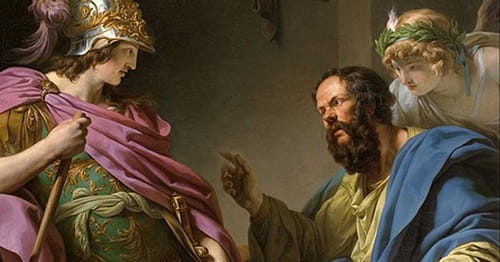The Life and Philosophy of Socrates
Welcome to the captivating world of ancient Greece, where the foundations of Western philosophy were laid and where the remarkable life and philosophy of Socrates unfolded. As we embark on this journey, we invite you to explore the profound ideas, intriguing anecdotes, and enduring legacy of one of history’s most influential thinkers.
Socrates held a profound conviction that “the unexamined life is not worth living.” He believed that true happiness and fulfillment could only be achieved through the cultivation of virtue and the relentless pursuit of knowledge. In his critiques of the Sophists, Socrates emphasized the existence of objective truths and universal principles of ethics, challenging the prevailing relativism of his time.
Join us as we embark on this remarkable journey through the life and philosophy of Socrates, uncovering the wisdom, insights, and enduring impact of this extraordinary philosopher from ancient Greece.
The Life and Philosophy of Socrates: Unveiling the Wisdom of Ancient Greece
Socrates: Early Life and Influences
Birth and Family Background
Socrates was born in Athens, one of the most vibrant intellectual and cultural centers of ancient Greece. Athens was known for its democratic governance, flourishing arts, and philosophical discussions. Socrates’ birth in this intellectually stimulating environment set the stage for his later philosophical pursuits.

The Life and Philosophy of Socrates.
Socrates grew up during a time of political and social transformation in Athens. The city-state was transitioning from aristocratic rule to democracy, with an increasing focus on individual freedoms and participation in civic affairs. These political changes would deeply influence Socrates’ belief in the importance of active citizenship and critical thinking.
Mentorship under Archelaus and Anaxagoras
Socrates’ thirst for knowledge led him to seek guidance from influential thinkers of his time.
Archelaus, a philosopher, and physicist, introduced Socrates to the study of natural phenomena and the underlying principles governing the universe. Through Archelaus’ teachings, Socrates developed an appreciation for the power of reason and the importance of observing the world through a philosophical lens.

Archelaus was an Ancient Greek philosopher, a pupil of Anaxagoras. – The Life and Philosophy of Socrates.
Anaxagoras, another significant mentor, further shaped Socrates’ intellectual development. Anaxagoras emphasized the role of the mind (nous) as the driving force behind the cosmos, challenging prevailing notions of supernatural explanations for natural phenomena. This emphasis on rationality and the power of the mind resonated deeply with Socrates and laid the groundwork for his own philosophical investigations.

Anaxagoras, by the Spanish painter Jusepe de Ribera, Baroque style, 1636 – The Life and Philosophy of Socrates.
The Influence of the Sophists
The Sophists, a group of itinerant educators, played a significant role in shaping Socrates’ philosophical journey. The Sophists specialized in teaching rhetoric, persuasive speaking, and the art of argumentation. They traveled throughout Greece, offering their services to those seeking to improve their communication and debate skills.
While Socrates engaged with the Sophists, he also held a critical stance toward their teachings. He observed that the Sophists often prioritized winning arguments over seeking truth and understanding. This observation sparked Socrates’ dissatisfaction with the relativistic approach of the Sophists and motivated him to develop his own unique method of inquiry.
Socrates’ exposure to the Sophists’ emphasis on persuasive speaking and the art of rhetoric influenced his own pursuit of truth. He recognized the power of language and dialogue in uncovering deeper insights and challenging prevailing beliefs. However, unlike the Sophists, Socrates sought to engage in genuine philosophical inquiry, using dialogue to unravel the truth and stimulate critical thinking.
The Socratic Method: Quest for Truth
Dialogue as a Path to Knowledge
At the heart of Socrates’ philosophy lies his unique method of engaging in dialogue. Socrates believed that genuine knowledge could be attained through open and honest conversation. Through dialogue, he aimed to provoke critical thinking, challenge preconceived notions, and foster a deeper understanding of complex ideas.

Socrates was a Greek philosopher from Athens who is credited as the founder of Western philosophy and among the first moral philosophers of the ethical tradition of thought.
Unlike traditional teaching methods that involve lecturing or dogmatic instruction, Socrates approached philosophical inquiry as a collaborative process. He engaged his interlocutors in a series of thought-provoking questions and encouraged them to explore their own beliefs and assumptions. Through this process, participants were compelled to critically examine their ideas and uncover deeper truths.
Irony and Socratic Ignorance
One of the key elements of the Socratic method is the use of irony and what is known as Socratic ignorance. Socrates would feign ignorance, often claiming that he knew nothing, to encourage others to question their own knowledge and assumptions. By admitting his own lack of knowledge, he created an atmosphere of intellectual humility that encouraged others to participate actively in the pursuit of truth.

“I know that I know nothing” – Socrates
The socratic irony was not about mockery or deceit but rather a strategic tool to expose contradictions and stimulate deeper thinking. Socrates would engage individuals in conversation, gradually unraveling their beliefs and challenging them to critically examine the inconsistencies or gaps in their reasoning. Through this process, he sought to awaken his interlocutors’ intellectual curiosity and guide them toward a more refined understanding of their own beliefs.
The Elenchus: Questioning Assumptions
Central to the Socratic method is the elenchus, a process of questioning and cross-examination employed by Socrates to expose flawed or unsupported beliefs. Through skillful questioning, Socrates would carefully dismantle his interlocutors’ arguments, revealing logical inconsistencies or contradictions in their thinking.
The elenchus aimed not only to refute false beliefs but also to foster self-reflection and self-awareness. By challenging assumptions and revealing inconsistencies, Socrates guided individuals toward a deeper examination of their own knowledge and values. This process often led to the realization of intellectual gaps or the need for further inquiry, fostering a more robust understanding of the subject matter at hand.
Through the Socratic method, Socrates sought to ignite intellectual curiosity, inspire critical thinking, and uncover genuine knowledge. His emphasis on dialogue, irony, and the elenchus provided a framework for engaging in meaningful philosophical inquiry. Today, the Socratic method continues to be celebrated as a powerful tool for stimulating thoughtful discussion, promoting self-reflection, and cultivating intellectual growth.
The Unexamined Life Is Not Worth Living
The Role of Virtue and Moral Conduct
For Socrates, a life without virtue and moral conduct was empty and devoid of true fulfillment. He believed that genuine happiness and a meaningful existence could only be attained through the cultivation of a virtuous character.
Socrates considered virtues such as justice, wisdom, courage, and temperance as essential qualities to be practiced and upheld in one’s actions and decisions. He emphasized the importance of aligning one’s values and behaviors with moral principles, asserting that living a virtuous life leads to personal excellence and contributes to the well-being of society as a whole.
Socrates’ Critique of the Sophists
Socrates was highly critical of the relativistic approach to morality and knowledge promoted by the Sophists.
The Sophists claimed that truth and ethics were subjective and dependent on individual preferences or societal conventions. In contrast, Socrates firmly believed in the existence of objective truth and universal principles of ethics that could be discovered through rational inquiry and critical thinking. He saw the Sophists’ emphasis on winning arguments and manipulating language as a betrayal of the pursuit of genuine knowledge and virtue.
Socrates engaged in debates and discussions with the Sophists, challenging their relativistic stance and advocating for the existence of timeless and universal ethical standards. He sought to demonstrate that ethical conduct and moral judgments could be grounded in reason and guided by a deep understanding of fundamental truths about human nature and the nature of the world.
The Pursuit of Self-Knowledge
At the core of Socrates’ philosophy was the belief that self-knowledge is the foundation of personal growth and a life well-lived. He famously proclaimed, “Know thyself,” encouraging individuals to engage in introspection and self-examination. Socrates believed that by understanding one’s own beliefs, desires, and limitations, individuals could gain insight into their true nature and make informed choices that align with their values.

“Know thyself” – Socrates
Socrates‘ emphasis on self-knowledge went beyond mere self-awareness. He believed that true wisdom and moral development arise from a deep understanding of oneself and one’s place in the world. Through critical self-reflection and the recognition of one’s own ignorance, individuals could embark on a lifelong journey of personal transformation, continuously seeking knowledge and striving to align their thoughts and actions with moral virtue.
Socrates’ philosophy reminds us of the importance of reflecting upon our own values, examining our beliefs, and striving for moral excellence. By embracing self-knowledge and the pursuit of virtue, we can lead more fulfilling lives, contribute positively to society, and realize our full potential as individuals.
The Trial of Socrates
The Accusers: Meletus, Anytus, and Lycon
The trial of Socrates was a watershed moment in ancient Athens. Socrates faced three primary accusers: Meletus, Anytus, and Lycon. Meletus, a poet, accused Socrates of impiety, claiming that he did not acknowledge the gods recognized by the city and introduced new deities. Anytus, a politician, accused Socrates of corrupting the youth by questioning traditional values and promoting skepticism. Lycon, an orator, joined the charges against Socrates, likely due to his association with the Sophists, whom Socrates was critical of.

The Death of Socrates, by Jacques-Louis David, c. 1787, via Metropolitan Museum of Art.
Recommended For You – The 10 Best Art Museums in the World
The Charges and the Apology
During his trial, Socrates was charged with impiety and corrupting the youth, both serious offenses in Athenian society. In his defense, Socrates delivered his famous speech known as the Apology, not in the sense of an apology for his actions, but rather a defense of his philosophical mission. Socrates argued that his inquiries aimed to seek wisdom and challenge individuals to critically examine their beliefs, rather than corrupting the youth or disrespecting the gods.
In his Apology, Socrates eloquently presented his case, challenging the validity of the accusations and demonstrating the inconsistencies in the arguments of his accusers. He emphasized that his mission was to provoke self-reflection, stimulate intellectual growth, and lead others to a more virtuous and examined life. Socrates’ defense was characterized by his characteristic Socratic irony and his commitment to truth, even in the face of potential consequences.
The Defiance of the Oracle and Divine Mission
An essential aspect of Socrates’ trial was his unwavering dedication to his philosophical calling, which played a significant role in his eventual martyrdom. Socrates had been told by the Oracle at Delphi that no one was wiser than him. Instead of accepting this as a statement of his own wisdom, Socrates embarked on a mission to understand the true meaning of the Oracle’s proclamation. He engaged in dialogues with various individuals, including politicians, poets, and craftsmen, seeking wisdom and testing the claims of those who were deemed wise.
Socrates’ relentless pursuit of truth and his commitment to questioning conventional wisdom drew the ire of influential figures in Athenian society. Despite facing accusations, Socrates refused to abandon his philosophical mission or compromise his principles. His unwavering defiance and unwillingness to compromise his commitment to truth and virtue ultimately led to his conviction and the imposition of the death penalty.
The trial and subsequent execution of Socrates marked a significant moment in the history of philosophy. It not only highlighted the tension between individual freedom of thought and societal norms but also solidified Socrates’ legacy as a martyr for intellectual inquiry and as a symbol of the enduring pursuit of truth, regardless of the consequences.
Socrates in Popular Culture
Socratic References in Literature and Art
Socrates’ profound impact on philosophy and his iconic status as a thinker has made him a frequent subject of literary works and a source of inspiration for artists throughout history. The dialogues of Plato, Socrates’ most famous student, serve as a primary source for understanding his philosophy and have shaped Western philosophical discourse. These dialogues depict Socrates engaging in intellectual conversations with various interlocutors, presenting his distinct method of inquiry and exploring profound philosophical concepts.
Recommended For You – Plato’s Republic (Politeia) – Summary and Analysis
Beyond philosophy, Socrates has been referenced in works of literature from different eras. Writers like Friedrich Nietzsche, Ralph Waldo Emerson, and Albert Camus have drawn inspiration from Socrates’ intellectual rigor and his commitment to truth-seeking. His philosophical legacy continues to resonate in contemporary literature, with authors incorporating Socratic themes and principles into their works.
Socrates’ influence is not confined to literature alone. The realm of visual arts has also embraced his presence. Renaissance painters, such as Raphael and Jacques-Louis David, depicted Socrates in their artworks, capturing his iconic figure engaged in philosophical discussions. These paintings not only immortalize Socrates but also serve as visual representations of his intellectual stature and enduring impact on Western thought.

The School of Athens, 1509-1511 by Raphael – The Life and Philosophy of Socrates: Unveiling the Wisdom of Ancient Greece.

Aeschines and Socrates – The School of Athens, 1509-1511 by Raphael.
Socrates in Film and Theater
The allure of Socrates’ life and philosophy has found its way into the realms of film and theater. Filmmakers and playwrights have brought his story to the screen and stage, presenting his charismatic personality and profound ideas to wider audiences.
In cinema, films like “Socrates” (1970) and “The Trial of Socrates” (2013) have portrayed key moments from Socrates’ life, including his interactions with Athenian society and his trial. These cinematic adaptations often strive to capture Socrates’ wisdom, moral courage, and unyielding commitment to truth, leaving audiences inspired by his intellectual journey.

Socrates (1970) (Movie) – A false accusation leads the philosopher Socrates to trial and condemnation in the 4th century BC Athens.
Similarly, theater productions have embraced Socrates as a compelling character to explore on stage. Playwrights have created adaptations and original works centered around Socrates, showcasing his philosophical dialogues, the impact of his teachings on his followers, and his ultimate fate in the face of Athenian accusations.
Socratic Influence on Modern Education
Socrates’ influence extends beyond philosophy and the arts, permeating the field of education. His emphasis on critical thinking, questioning assumptions, and engaging in meaningful dialogue has profoundly impacted modern educational practices and pedagogical approaches.
The Socratic method, characterized by inquiry-based learning and student-centered discussions, has become a cornerstone of education. It encourages students to actively participate in the learning process, challenge their own assumptions, and develop analytical and reasoning skills. By fostering intellectual curiosity and promoting critical inquiry, educators aim to empower students to become independent thinkers and lifelong learners.
Socrates’ commitment to self-examination and the pursuit of knowledge also resonates in contemporary educational philosophies that prioritize personal growth, self-reflection, and the development of moral character alongside academic learning. The focus on holistic education, nurturing ethical values, and fostering intellectual curiosity can be traced back to Socrates’ profound influence on the educational landscape.
Through literature, art, film, and education, Socrates continues to inspire and captivate audiences around the world. His enduring presence in popular culture is a testament to the timeless relevance of his philosophy and the profound impact he has had on human thought and understanding.
References:
- Ahmet CEVİZCİ – Felsefe Tarihi
- Ahmet ARSLAN – İlk Çağ Felsefe Tarihi 2
- https://en.wikipedia.org/wiki/Archelaus_(philosopher)
- https://research-bulletin.chs.harvard.edu/2016/11/01/history-of-philosophy/
- https://socratesjourney.org/anaxagoras-and-mind/
- https://en.wikipedia.org/wiki/Socrates
- https://www.linkedin.com/pulse/know-thyself-three-steps-understanding-jeff-hicks/
- https://en.wikipedia.org/wiki/The_School_of_Athens
- https://www.imdb.com/title/tt0210296/
- https://www.thecollector.com/the-famous-trial-of-socrates/








